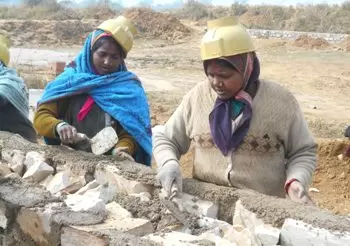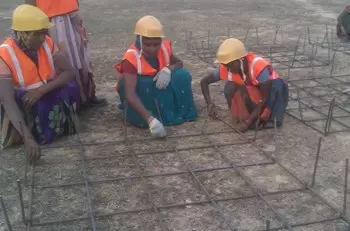Preparing women for construction and related work and then getting them employment too
16-February-2015
Vol 6 | Issue 7
One would not expect to find anything remarkable about an agri-warehouse construction site in an obscure village called Tilouli. But when half a dozen mini buses rumble up to the gates and 300 construction workers, all women, alight from them, the curiosity is piqued.
Donning bright yellow helmets and pulling on loose grey shirts over their saris, within minutes they get the place humming with activity.
 |
|
Female masons are expertly managing all the work at the construction site in Sonbhadra district of Uttar Pradesh
|
They operate the cement mixers with panache, mix concrete in the right proportion, take measurements and erect shuttering /formwork to pour concrete. In addition, they cut, bend and tie steel to place reinforcements inside the shuttering and efficiently build stone masonry foundations.
In a few months, this all-women construction team, possibly the first-of-its-kind in India, would have erected 10 large warehouses on this vast site in Sonbhadra district of Uttar Pradesh.
“Only five per cent of the labour force here is male, which explains why this site is noisier than others! Unlike men, who work silently, women prefer to work in talkative groups. The comfort and safety perception of the women is high in this sort of setup,” remarks Santosh Parulekar, co-founder and CEO of Pipal Tree Ventures, which has put together this group of skilled female construction workers.
After working abroad for 17 years, Parulekar, an engineering and management graduate, returned to India to set up Pipal Tree Ventures in 2007, which is devoted to the cause of creating organised employment for the poor, land less educated village youth.
With its main training centre at Hyderabad, Andhra Pradesh, the organisation currently runs 23 such schools in villages across Andhra, Bihar, Odisha, Rajasthan, Uttar Pradesh and West Bengal. Incidentally, most of them are located in sensitive, naxal-affected areas.
From masonry, steel fixing, painting and plumbing to truck driving, the trainees get to pick up skills that are valued in the construction industry. Once the course is complete, they are given jobs with large construction companies where Pipal Tree operates as a civil contractor.
In this way, it continues to supervise, mentor and support its wards, who are simply thrilled to get a regular monthly salary and benefits like provident fund and medical insurance. To date, the organisation has trained around 15,000 people, including 1,000 women.
“This industry has great potential to generate employment, but due to its unorganised nature, labourers are vulnerable to exploitation,” states Parulekar. Pipal Tree is attempting to change this scenario by bringing in more ethical practices. Additionally, it is making a conscious effort to create a space for rural women in the industry.
In fact, Parulekar is determined to make his all-women crew experiment a success, “Rural women have few employment options; in this way we are seriously exploring whether the construction sector can provide them gainful and regular work.”
“I was rather skeptical when the idea of training women for construction work was first discussed,” confesses Kalyani Chappidi, 32, a civil engineer and trainer with Pipal Tree for seven years. After training and mentoring 100 women, though, she has changed her mind. “Women actually learn much faster and are more meticulous. They are especially skilled at paintwork,” she says.
According to Chappidi, around 20 per cent of the women who come to Pipal Tree for training are single parents. The rest are seeking an independent income. They undergo a free three-month course, after which they are placed on site.
With free lodging and boarding thrown in, Pipal Tree incurs an expense of around Rs 30,000 per trainee. At the Sonbhadra site, however, the training had to be waived – the women wanted to start earning right away. So, after a basic two-week initiation programme, it was decided that they could learn on the job.
“In areas that are affected by naxal violence migration of men is common. It is the women left behind who seek work to contribute to the household earnings. While some of the women had earlier sought employment under the Mahatma Gandhi Rural Employment Guarantee Act (MGNREGA) they decided to sign up with us citing payment delays in the government-run scheme. Also, at a starting salary of Rs 6,000 per month for an apprentice, our rates are higher,” says Parulekar.
While Pipal Tree pays Rs 6,000 to a beginner, wages are hiked periodically as they gain experience – earnings can reach Rs 9,000 per month after a couple of years. Salaries go directly to their bank accounts, and they can withdraw money with an ATM card.
This entire experience has been quite novel for women like Munni Devi, 35, who has been working at the Sonbhadra site since the past three months. “I use part of the money I make to buy fertiliser and seeds for our farm, and I spend some on my children,” she says.
Apart from the money, Munni appreciates the fact that Pipal Tree provides her a safe working environment as well as a pick and drop from their homes. “Women are only willing to work if we provide transport. It is a huge, but unavoidable expense,” says Parulekar.
Transportation expense apart, Pipal Tree is absorbing other costs on the Sonbhadra project as well. “We are incurring a monthly loss of Rs 10 lakh but since this is not purely a business venture, we plan to absorb it. The women are learning fast; we expect to start breaking even in six months,” says Parulekar, optimistically.
As the work progresses, the women will learn plumbing, tile laying and painting, a prospect that excites Heena Khatton, 20. This young matriculate, who is expecting her first child, started working because her husband “shows no inclination to earn”. She likes the work and is even willing to migrate to other sites, if required.
 |
|
Rural women have few employment options. The construction sector can provide them gainful and regular work
|
Whereas migration is inevitable in this line women are mostly migration-averse, which is why offering them long-term employment is posing to be a problem for Parulekar. And the challenges do not end there. The project on which these women are presently working took off because the company that hired Pipal Tree was open to the experiment and placed value on its underlying cause.
Most construction companies Parulekar approaches, though, are averse to having women labourers on their site. The concerns relate more to the women’s safety than to any doubts about their ability. “Every time there is a highly publicised incident like the Uber rape, companies’ reluctance to hire women increases,” he says.
Parulekar feels confident that the all-women crews would be a hit once the Sonbhadra project proves to be financially viable. He hopes to convince more companies to give them a chance.
Offering a glimmer of hope is a project in Gujarat, where he has got the go-ahead to employ a women’s team to paint the interiors and exteriors of a four-storey school. “They will work on the jobsite in saris because cultural factors prevent them from switching to a more convenient attire. We will design safer scaffolding for them,” reassures Chappidi.
In the meantime, Parulekar is working on an intra-state migration plan and looking at other industries where this training-cum-employment strategy for less educated rural women can be implemented.
Ultimately, he hopes the women will find gainful employment. “They can even take up private houses and other small projects in their vicinity,” he says. Without so much as uttering the much battered “women’s empowerment” slogan, Pipal Tree is creating a model that at once enables women to become financially independent and storm a decidedly male bastion. - Women's Feature Service














